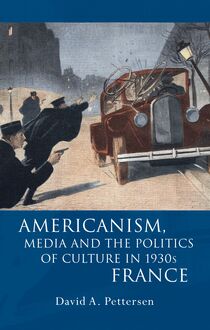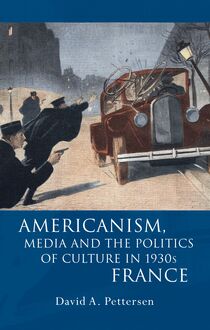-
 Univers
Univers
-
 Ebooks
Ebooks
-
 Livres audio
Livres audio
-
 Presse
Presse
-
 Podcasts
Podcasts
-
 BD
BD
-
 Documents
Documents
-
- Cours
- Révisions
- Ressources pédagogiques
- Sciences de l’éducation
- Manuels scolaires
- Langues
- Travaux de classe
- Annales de BEP
- Etudes supérieures
- Maternelle et primaire
- Fiches de lecture
- Orientation scolaire
- Méthodologie
- Corrigés de devoir
- Annales d’examens et concours
- Annales du bac
- Annales du brevet
- Rapports de stage
La lecture à portée de main
Vous pourrez modifier la taille du texte de cet ouvrage
Découvre YouScribe en t'inscrivant gratuitement
Je m'inscrisDécouvre YouScribe en t'inscrivant gratuitement
Je m'inscrisEn savoir plus
Vous pourrez modifier la taille du texte de cet ouvrage
En savoir plus

Description
Sujets
Informations
| Publié par | University of Wales Press |
| Date de parution | 15 octobre 2013 |
| Nombre de lectures | 0 |
| EAN13 | 9781783165858 |
| Langue | English |
Informations légales : prix de location à la page 0,1900€. Cette information est donnée uniquement à titre indicatif conformément à la législation en vigueur.
Extrait
FRENCH AND FRANCOPHONE STUDIES
France’s Colonial Legacies
Series Editors
Hanna Diamond (University of Bath)
Claire Gorrara (Cardiff University)
Editorial Board
Ronan le Coadic (Université Rennes 2)
Nicola Cooper (Swansea University)
Maxim Silverman (University of Leeds)
Didier Francfort (Université Nancy 2)
Sharif Gemie (University of Glamorgan)
H. R. Kedward (Sussex University)
Margaret Majumdar (University of Portsmouth)
Nicholas Parsons (Cardiff University)
Other titles in the series
Memory and Politics: Representations of War in the Work of Louis Aragon
Angela Kimyongür
At The Border: Margins and Peripheries in Modern France
Edited by Henrice Altink and Sharif Gemie
Haunting Presences: Ghosts in French Literature and Culture
Edited by Kate Griffiths and David Evans
French Fiction into the Twenty-first Century: The Return to the Story
Simon Kemp
Wine Drinking Culture in France: A National Myth or a Modern Passion?
Marion Demossier
French Muslims: New Voices in Contemporary France
Sharif Gemie
Memories of May ’68: France’s Convenient Consensus
Chris Reynolds
Mindscapes of Montréal: Québec’s Urban Novel, 1960–2005
Ceri Morgan
Women’s Writing in Twenty-First-Century France: Life as Literature
Edited by Amaleena Damlé and Gill Rye
Cinema and the Republic: Filming on the Margins in Contemporary France
Jonathan Ervine
Adapting Nineteenth-Century France: Literature in Film, Theatre, Television, Radio and Print
Kate Griffiths and Andrew Watts
FRENCH AND FRANCOPHONE STUDIES
France’s Colonial Legacies
Memory, Identity and Narrative
Edited by
FIONA BARCLAY
© The Contributors, 2013
All rights reserved. No part of this book may be reproduced in any material form (including photocopying or storing it in any medium by electronic means and whether or not transiently or incidentally to some other use of this publication) without the written permission of the copyright owner except in accordance with the provisions of the copyright, designs and patents act 1988. Applications for the copyright owner’s written permission to reproduce any part of this publication should be addressed to the University of Wales Press, 10 Columbus Walk, Brigantine Place, Cardiff, CF10 4UP.
www.uwp.co.uk
British Library Cataloguing-in-Publication Data
A catalogue record for this book is available from the British Library.
ISBN 13 978-0-7083-2667-1
ISBN e-book 978-1-78316-585-8
The rights of the Contributors to be identified as authors of this work has been asserted by them in accordance with sections 77 and 78 of the Copyright, Designs and Patents Act 1988.
Cover image: After Fabrice Hyber, Le Cri, l’Écrit (2007), polychrome bronze sculpture. Image © Nicola Frith.
Contents
Series Editor’s Preface
Foreword
Acknowledgements
List of figures
Notes on contributors
Introduction: The Postcolonial Nation
Fiona Barclay
Part One: Narrative Gaps
Chapter One: Amnesia about Anglophone Africa: France’s Rhodesian Mindset, its Manifestation and Legacies
Joanna Warson
Chapter Two: From ‘Écrivains coloniaux’ to Écrivains de ‘langue française’: Strata of Un/acknowledged Memories
Gabrielle Parker
Part Two: The Algerian War, Fifty Years On
Chapter Three: Conflicting Memories: Modernisation, Colonialism and the Algerian War Appelés in Cinq colonnes à la une
Iain Mossman
Chapter Four: Derrida’s Virtual Space of Spectrality: Cinematic Haunting and the Law in Herbiet’s Mon Colonel
Fiona Barclay
Chapter Five: ‘Le devoir de mémoire’: the Poetics and Politics of Cultural Memory in Assia Djebar’s Le Blanc de l’Algérie
Jenny Mullen
Chapter Six: (Un)packing the Suitcases: Postcolonial Memory and Iconography
William Kidd
Part Three: The Transnational Family
Chapter Seven: Interrogating the Transnational Family: Memory, Identity and Cultural Bilingualism in Traoré’s Sous la clarté de la lune
Zélie Asava
Chapter Eight: Continuity and Discontinuity in the Family: Looking Beyond the Post-Colonial in Claudel’s Il y a longtemps que je t’aime
Fiona Handyside
Part Four: Contemporary Commemorations
Chapter Nine: Anti-racism, Republicanism and the Sarkozy Years: SOS Racisme and the Mouvement des Indigènes de la République
Thomas Martin
Chapter Ten: Playing out the Postcolonial: Football and Commemoration
Cathal Kilcline
Chapter Eleven: Crime and Penitence in Slavery Commemoration: From Political Controversy to the Politics of Performance
Nicola Frith
Series Editors’ Preface
This series showcases the work of new and established scholars working within the fields of French and francophone studies. It publishes introductory texts aimed at a student readership, as well as research-orientated monographs at the cutting edge of their discipline area. The series aims to highlight shifting patterns of research in French and francophone studies, to re-evaluate traditional representations of French and francophone identities and to encourage the exchange of ideas and perspectives across a wide range of discipline areas. The emphasis throughout the series will be on the ways in which French and francophone communities across the world are evolving into the twenty-first century.
Hanna Diamond and Claire Gorrara
Foreword The Monument as a Space of Frictions
FRANÇOISE VERGÈS
The notion of a ‘crime against humanity’ in international law after World War II led to a revision of the reading of genocides, massacres, mass deportations and dictatorships. The massive destruction of European Jews and other groups committed by Nazism opened the way to rethinking colonial slavery, colonial crimes and politics of segregation within the frame of that notion. There was an increased need for memorials which honoured the victims and their suffering, recognised that a crime had been committed and invited heightened civic awareness and action. The memorial acquired a new meaning in the public space. It was conceived of as carrying a double message – ‘Remember’ and ‘Act’.
France has not escaped this movement, but colonial memories remain a difficult issue and the place and role of colonisation in the making of modern France is still marginalised. Accusations of ‘ communautarisme ’ and of ‘dividing the Republic’ have been thrown to hinder the revisionist movement that has been launched. The war of Algerian independence is a case in point, regularly raising controversies, its fragmented memories producing a continuing ‘war of memories’. Yet, the Algerian war should not mask the other demands for the recognition of colonial crimes: Madagascar 1947, Indochina, Cameroon, or the riots of the 1960s in the overseas departments and, of course, colonial slavery. Although, in the case of slavery, its condemnation is now largely accepted, questions that go along with the creation of memorials seem to constitute an obstacle for a full acknowledgement of its place and role in the making of modern France. Questions such as, ‘What allowed the crime to occur? How was consent fabricated? What is our responsibility long after the crime has occurred?’ still provoke dilatory answers (‘intra Africa slavery was very bad’, ‘the Muslim slave trade had more victims’) or an empty rhetoric about the ‘duty to remember’. Both seek to save ‘France’ from the responsibility and long complicity in predatory economy, destruction of indigenous peoples, deportation of Africans during colonial slavery, conquest of sovereign territories, post-slavery colonial economy and politics, wars against anti-colonial movements, postcolonial racism . . .
Yet, since 1998, and particularly following the adoption of the Taubira law in 2001 that recognised slave trade and slavery as ‘crimes against humanity’, progress has been made in the fields of education, research and culture, thanks in great part to the work of associations. The Committee for the Memory of Slavery installed in 2004 in application of the Taubira law lobbied for the installation of a monument. In 2007, ‘Le Cri, l’Écrit’, by the contemporary artist Fabrice Hyber, was inaugurated in the Jardin du Luxembourg, Paris. An image of the sculpture appears on the cover of this volume. It was a creative interpretation of breaking the chains which, since Antiquity, has been the metaphor of escaping servitude and has become with the European abolitionist movement’s iconography the hegemonic metaphor of freedom. 1 In the past decade other monuments and steles have been built in the Hexagon and the overseas departments, the number of research theses has increased, galleries in museums and exhibitions dedicated to slavery have opened and associations of memory have been very active in the Hexagon and the overseas territories. Governments since 2001 – Chirac and Sarkozy (it is too soon to evaluate what François Hollande will do) – have not sought to directly oppose activities around the memories of slavery, although under the presidency of Sarkozy, the use of the notion of ‘repentance’ created a context in which a new reading of colonial history was obstructed. Everyone agreed that ‘slavery was bad’ but the ways in which colonial slavery had been the matrix of future colonial politics and practices, the ways in which colonial slavery had shaped French arts, thought and national identity, and how it had been the source of anti-black racism were pushed aside. The shadow cast by slavery upon our times was often ignored. The entrenched confusion between ‘reparation’ and financial compensation has foreclosed any debate on a politics of reparation that would address the legacies of colonial slavery.
The necessary move from commemoration to concrete actions so that the memorial does not become a space of empty rituals erasing once again the trace of the crime, is yet to be made. This threatens ‘Le Cri, l’Écrit’. Indeed, a monument on colonial slavery becomes a ‘living monument’ if it finds social and cultural meaning within a wide movement of civic education on colo
-
 Univers
Univers
-
 Ebooks
Ebooks
-
 Livres audio
Livres audio
-
 Presse
Presse
-
 Podcasts
Podcasts
-
 BD
BD
-
 Documents
Documents
-
Jeunesse
-
Littérature
-
Ressources professionnelles
-
Santé et bien-être
-
Savoirs
-
Education
-
Loisirs et hobbies
-
Art, musique et cinéma
-
Actualité et débat de société
-
Jeunesse
-
Littérature
-
Ressources professionnelles
-
Santé et bien-être
-
Savoirs
-
Education
-
Loisirs et hobbies
-
Art, musique et cinéma
-
Actualité et débat de société
-
Actualités
-
Lifestyle
-
Presse jeunesse
-
Presse professionnelle
-
Pratique
-
Presse sportive
-
Presse internationale
-
Culture & Médias
-
Action et Aventures
-
Science-fiction et Fantasy
-
Société
-
Jeunesse
-
Littérature
-
Ressources professionnelles
-
Santé et bien-être
-
Savoirs
-
Education
-
Loisirs et hobbies
-
Art, musique et cinéma
-
Actualité et débat de société
- Cours
- Révisions
- Ressources pédagogiques
- Sciences de l’éducation
- Manuels scolaires
- Langues
- Travaux de classe
- Annales de BEP
- Etudes supérieures
- Maternelle et primaire
- Fiches de lecture
- Orientation scolaire
- Méthodologie
- Corrigés de devoir
- Annales d’examens et concours
- Annales du bac
- Annales du brevet
- Rapports de stage




















